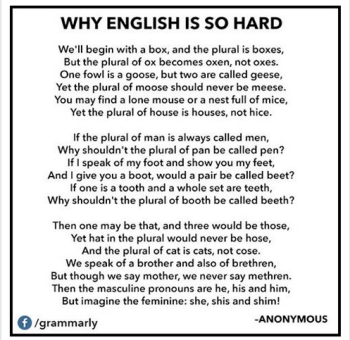Is The English Language Confusing?
By JENNY ARCHER
@bookbar (1609)
Sudbury, England
October 3, 2015 2:10pm CST
Well as a native of Britain, and English speaking from birth, even though I am Welsh, I would say definitely yes, and I pity anyone who has to try learning it from scratch.
Maybe, the British Bulldog, had a hand in inventing the language too
So many words that sound the same, but have totally different meanings, is just one minor stumbling block, but there are hundreds, some of which, even the natives, never get to grips with, unless you really make a study of it.
I'll give you a 'for instance'.. today I was looking for a word,merely to check I'd used it's right form, and was waylaid by a page, that said ...Homonyms, Homophones, and Homographs... so OK, have a vague idea...But actually, What are they?
Here's the Definition!...
Homonyms, homophones, and homographs are words that are easily confused because they look alike or sound alike (or both) but have different meanings.
A few examples....
accept - take in...... except - other than
altar - table in a church......alter - to change
bail - to clear water....bail - release of a prisoner....bale - a large bundle
principal - main, most important.... principal - head of a school.... principle - rule
pair - two of something....pare - remove, cut back....pear - the fruit

 Won't carry on as there are hundreds of the damn things, courtesy of: http://grammar.about.com/
Nothing in Life is simple...but the English language takes that to extremes!
Won't carry on as there are hundreds of the damn things, courtesy of: http://grammar.about.com/
Nothing in Life is simple...but the English language takes that to extremes!

 Won't carry on as there are hundreds of the damn things, courtesy of: http://grammar.about.com/
Nothing in Life is simple...but the English language takes that to extremes!
Won't carry on as there are hundreds of the damn things, courtesy of: http://grammar.about.com/
Nothing in Life is simple...but the English language takes that to extremes!19 people like this
19 responses
@pgntwo (22405)
• Derry, Northern Ireland
3 Oct 15
People often confuse 'affect' and 'effect': "The weather affects my mood." versus "The effect of weather on a person's mood can be profound.". Consider also: "The astronaut effected the manoeuvre perfectly." vs. "The angle of incidence affected his vision.", amongst many, many others...
7 people like this

@xFiacre (14160)
• Ireland
3 Oct 15
@pgntwo And then there are those of us who without thinking use a mixture of words in the one sentence from the various languages they are conversant with. I often substitute Tumbuku words for English when they sound more like what I'm trying to express.
6 people like this
@pgntwo (22405)
• Derry, Northern Ireland
3 Oct 15
@bookbar We all do that checking thing, it is called attention to detail. I think the phonemes we use are all in place by the time we are six or so, so exposure to a word that needs a different configuration of tongue, throat and breathing control after that adds to the difficulty: look at the welsh town Machynlleth, as an appropriate example. and then take the Arabic glottal stop, the "q" in "Luqa" or "Qormi" (more place-names, in Malta this time), the closest equivalent of which is a "k" in English. It is probably beneficial for all to be exposed to foreign languages from an early age.
6 people like this

@jaboUK (64346)
• United Kingdom
3 Oct 15
Here is part of a poem I wrote some months ago, though I see that some of your other commenters have given the same examples:
To non-English speakers it's tough
To find out that stuff rhymes with rough,
Though not with plough
Or through or with bough,
Who could blame them for saying 'enough'?
7 people like this
@indexer (4852)
• Leicester, England
5 Oct 15
Jabo's limerick reminds me of the story of the Frenchman who was travelling to London by train some years ago, having taken the ferry to Dover. He was reading a book to help him with his English, which contained a list of awkward pronunciations - "trough pronounced troff - through pronounced throo - though pronounced tho - thorough pronounced thurrer". When his train arrived at Victoria station the first thing he saw was a poster for the local theatre: "Cats - pronounced success!" That was when he shot himself.
2 people like this

@Asylum (47893)
• Manchester, England
3 Oct 15
The English language can cause quite a confusion at times if people do not know the words that you use. There were many times at work that I sent out internal emails and foolishly allowed myself to use uncommon words. In most cases this simply resulted in people having no idea what I was saying, but sometimes because misconstrued. I remember an example whereby I used the verb obviate, which many people seemed to assume meant to make obvious, thus giving a totally wrong impression. Eventually I did learn to take greater care when sending emails to some members of staff.
5 people like this
@GardenGerty (167537)
• United States
4 Oct 15
i before e except when you are running a feisty heist on a weird, beige, foreign neighbor, or as I learned it "I before e except after c or when sounding as a as in neighbor and weigh.
4 people like this
@hereandthere (45628)
• Philippines
4 Oct 15
because vowels and consonants aren't the same in other languages. some people cannot pronounce six so can only manage sick. some cannot say paper and it ends up with a b sound. i remember an older officemate who couldn't pronounce pizza properly.
3 people like this

@bubuth (1815)
• Philippines
4 Oct 15
English is my second language but I'm not fluent. It really confuses me a lot. Here in the Philippines employees has a little bit of discrimination because once you don't know how to speak English, you're not able to get hired or get a good paying jobs.
2 people like this
@bookbar (1609)
• Sudbury, England
6 Oct 15
Oh dear,Bubuth..not much choice there then,if you want to earn money 

@Ragnarok8 (196)
• Davao, Philippines
4 Oct 15
I'm using it as my second language but still i find it really hard.Lol
3 people like this
@bookbar (1609)
• Sudbury, England
4 Oct 15
@Ragnarok8...I'm sure you are doing pretty well... and your English is far better than my Phillipino, which is non-existent 

1 person likes this
@owlwings (43900)
• Cambridge, England
4 Oct 15
The crossword puzzle I do most days makes good use of the way that we have words which sound the same. The first two (sometimes three) across clues always make up a word which sounds the same (more or less) as the two or three separate words. For example, a recent one had the three clues: Frizzy hair-do; Decease; Golf peg giving AFRO-DIE-TEE. Some of them are very clever, others are real groaners!
I have often been amused by the fact that some English words for 'hill' have alternative meanings which are complete opposites: 'down' and 'low' are the two prime examples
1 person likes this
@allknowing (153627)
• India
5 Oct 15
I always knew this. English is such a language that even Shakespeare must have had trouble writing his works.
1 person likes this
@TiarasOceanView (70020)
• United States
4 Oct 15
I am sure that all languages are confusing really too.
There are so many words, words, words.
I always find it so frustrating when two people speak the same language, yet are never able to understand each other.
I find that a lot here.
1 person likes this
@bookbar (1609)
• Sudbury, England
5 Oct 15
@TiarasOceanView...Great point and one often overlooked..speaking doesn't always mean understanding...
1 person likes this
@TiarasOceanView (70020)
• United States
5 Oct 15
@bookbar Yes it is a problem..and sometimes all it takes is to listen.




























